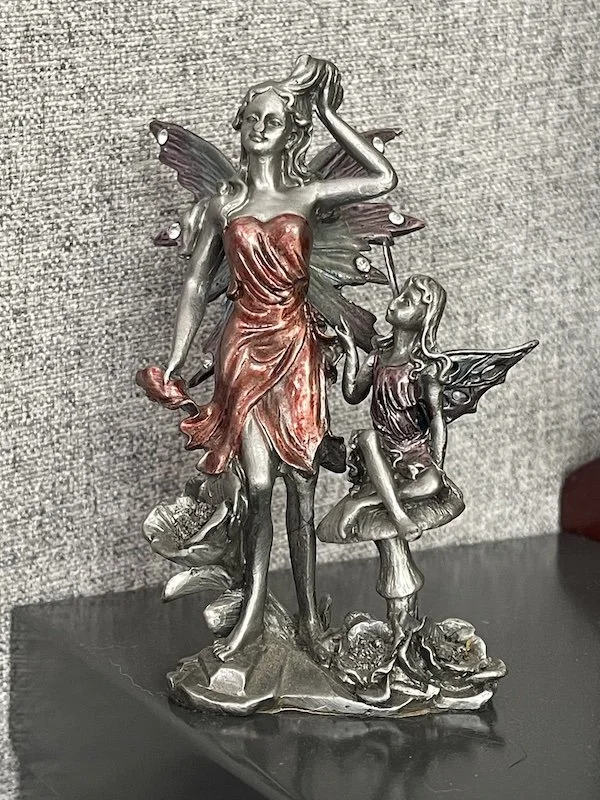Writing From the Inside Out 2022 Week 37 Prompts
based on Colleen Taylor’s Homesick
Read the poem
Do your own reflection on it, noting what it inspires in you
Feel free to use your own reflection as your prompt or…
Use the selection of prompts below the poem
Pick one that inspires you and write (feel free to use only one or write several poems using different prompts) or…
Don’t use any of the provided prompts and follow your inspiration from wherever it comes
Homesick
When I wade into the wood beside my everyday,
surbubanly normal house, when I step away
from television sets and sugar substitutes,
when I forget phones and hairspray and lightbulbs,
jokes that lack of humor and music that doesn't speak,
when I adorn myself in a cape of green and air,
lapping up the raw scent of tree leaves and grass,
soaking in the sound of pine needles crunched with wood,
I believe in fairy hills and pirate queens,
in swan children and Grainne and Deirdre,
I believe in the women before me, the stories
they told, mapping a magic trail to trace back time,
I believe in the smooth-cut isle jeweled in green
and I believe the women were right to leave.
—Colleen Taylor
Colleen Taylor (Poem from: Wingbeats II: Exercises and Practice in Poetry edited by Scott Wiggerman & David Meischen) https://colleen-taylor.com/about (I amniot actually sure if htis is her)
https://beyondthedreamline.wordpress.com/2017/10/10/ladies-of-legend-deidre-and-grainne/
Please join Writing From The Inside Out by attending the read-around sessions on Friday afternoons. It’s free, fun, a great way to share, and reading a poem is optional. If you have not registered, click the button below; and if you have registered, you do not need to register again, simply use the link sent to you in your confirmation email. Register Here:
Next Read Around is September 16, 2022 at 4:00 PM (PST)
My Thoughts
I've always had a strong sense that we live on the edge of another world, as if the ordinaryness of our every day life is a veil between us and the mythic realm told in stories and depicted in movies. If we could only escape the clutches of the ordinary, step away from our routines and the things that anchor us to the mundane, we might once again lap up the raw scent of nature, walk in the spirited forest, encounter miraculous beings, and discover our own magical self. Mythic stories, however, are not all light and joy. They are rife with bad actors, filled with dangers, darkness, and death that reflect realities we might not wish to face in our everyday world. How can we embrace the duplicity of the world with its stunning beauty and vicious brutality? Irish-American poet, Collen Taylor’s poem, Homesick, describes taking that step, how it opened her eyes to a dual lineage of the dispossesed, both in Irish folk tales about women and the sad history of the unmarried pregnant women who left Ireland to avoid forced labor and abuse in Magdalene Laundries run by the Church set up to rehabilitate “fallen women,” and which were endorsed and utilized by the government. Despite all of that, she still believes in the Emrerald Isle, in its legendary stories, and in the right of those women who chose to leave the island.
Prompt Menu
What folk or fairy tales (or cartoons) were you fascinated by as a child? Journal or write a poem about how that story impacted you. Consider how you might have lived out (or lived against) that story in your own life.
Journal or write a poem about the everyday activities of your routine life. In what way do these activites keep you tethered to “reality?” What might happen if you did not have them to anchor you to your days?
Imagine there is a wood or forest beside your everyday world. What creatures live in that imagined forest? What adventures await you there? What dangers lurk in the shadows. Imagine that forest is populated with your desires and fears and describe how they appear in the form of magical beings or fantasy creatures.
Joural or write a poem about the experience of being dispossed or feeling like an outcast.
Journal or write a poem about a group or class of people that were or are dispossessed —perhaps those from your own lineage, or from some other group, or from the refugee crises in the world as war and climate change cause migration.
Journal or write a poem about how you might face and hold the good, the bad, and the ugly in the world simultaneusly.
As usual, write about anything else that inspires you from the poem or from life that
